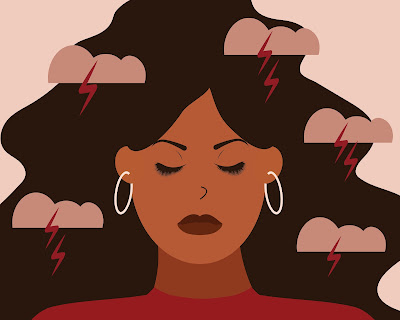Emotional avoidance is the tendency to avoid or control the experiencing or expression of distressing emotions. Although emotional avoidance might provide temporary relief, it's damaging in the long term (see my article: Changing Maladaptive Coping Strategies: Avoidance).
 |
| Emotional Avoidance and Unresolved Trauma |
Examples of Emotional Avoidance
Emotional avoidance can take many forms:
- workaholism
- Alcohol or drug abuse
- Out of control sexual behavior
- Compulsive gambling
- Overspending or so-called "retail therapy"
- Spending a lot of time watch TV as a distraction from painful emotions
- Spending a lot of time online to avoid painful emotions
- Engaging in infidelity
- Other forms of distraction and other maladaptive behavior
Emotional Avoidance as an Intra-Personal and Interpersonal Problem
Emotional avoidance can happen both intra-personally (on your own/within yourself) when you avoid feeling your emotions or interpersonally (with others) when you avoid experiencing or expressing yourself to your significant other, friends, family and others.
Why Do People With Unresolved Trauma Engage in Emotional Avoidance?
People with unresolved trauma often haven't developed the capacity to tolerate distressing emotions. They find it emotionally overwhelming, so it's understandable why they try to avoid experiencing or expressing these emotions, but there are consequences to this avoidance (see below).
The Problem With Avoiding Distressing Emotions Related to Trauma
Although people can avoid distressing emotions temporarily, over time these emotions can intensify and become increasingly difficult to avoid.
This could mean that they engage in more maladaptive behavior to avoid experiencing disturbing emotions. So, for instance, if they are drinking excessively, they might drink even more to suppress these emotions.
Since the mind and the body are connected, people who continue to avoid emotions can develop stress-related physical symptoms, including headaches and other body aches, high blood pressure, etc--as well as other mental health problems like depression and anxiety.
In addition, avoidant behavior prevents people with unresolved trauma from working through their trauma, so they are continually triggered emotionally.
Developing Better Coping Mechanisms in Therapy
One of initial strategies in trauma therapy is to help clients develop better coping mechanisms (see my article: Developing Coping Strategies Before Working on Trauma).
A skilled trauma therapist can help clients to develop a greater capacity to tolerate uncomfortable emotions by teaching them coping strategies (see my article: What is a Trauma Therapist?).
Depending upon the client and their trauma, this can take many forms. For instance, trauma therapist might teach them breathing exercises or meditation techniques to help alleviate their discomfort (see my articles: Square Breathing, Grounding Techniques, Trauma Therapy and Grounding Techniques and Safe Place Meditation).
For clients who are especially avoidant, they might start with a less distressing aspect of their unresolved problem. For instance, if there is a situation that a client categorizes as a 4 (on a scale of 0-10 with the higher scores related to more disturbance), a trauma therapist might help the client to learn to cope with that situation before moving on to more distressing situations that evoke a more avoidant response, like situations the client categorizes as a 7, 8, 9 or 10.
As the client develops the capacity to deal with the situations on the lower end of the scale, they can progress to situations higher up on the scale because they now have more of tolerance for difficult emotions (see my article: Expanding Your Window of Tolerance).
A skilled trauma therapist will help clients to develop the necessary internal resources before they work on reprocessing trauma (see my article: Developing Internal Resources and Coping Skills).
Reprocessing Unresolved Trauma
After the client has gone through the preparation phase of trauma therapy and they have the necessary internal resources, they will reprocess the trauma with a therapy that is specifically developed for trauma reprocessing, like EMDR therapy (see my article: EMDR Therapy Helps to Achieve Emotional Breakthroughs).
After the trauma has been successfully reprocessed, there is no longer a need to avoid emotions because they are no longer disturbing.
Getting Help in Therapy
Emotional avoidance provides temporary relief from disturbing emotions, but this usually causes even bigger problems for the individual and their relationships.
If you tend to avoid uncomfortable emotions, get help from a licensed mental health professional who specializes in trauma.
Once you have worked through unresolved trauma, you can live a more authentic and meaningful life that is free from your traumatic history.
About Me
I am a licensed New York City psychotherapist, hypnotherapist, EMDR, AEDP, EFT and Somatic Experiencing therapist.
I work with individual adults and couples, and I specialize in helping clients to overcome unresolved trauma.
To find out more about me, visit my website: Josephine Ferraro, LCSW - NYC Psychotherapist.
To set up a consultation, call me at (917) 742-2624 during business hours or email me.













.jpg)












